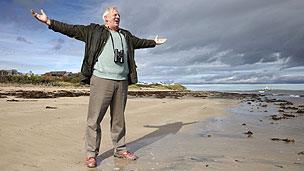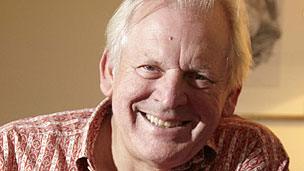'Real Billy Elliot' is made university chancellor
- Published

Sir Thomas Allen's talent for singing was discovered by a physics teacher
The performer who inspired the Billy Elliot story is going to be installed as the chancellor of Durham University.
The international opera star, Sir Thomas Allen, is to be formally inducted as the university's ceremonial head on Tuesday.
His journey from north-east England to the world's opera houses was the inspiration for the film about a young ballet dancer.
Sir Thomas said his progress had helped "pave the way" for others.
His story was credited as an inspiration by Lee Hall when he wrote Billy Elliot, the story of a boy in a mining village who pursues his talents as a dancer, despite the expectations and prejudices of his surroundings.
Back streets
"I identified with a lot of those feelings, those characters in the back streets I knew very well. It was all very recognisable," said Sir Thomas.

Sir Thomas Allen's career is going full circle, with his role at Durham University
"I can't remember anyone from my area doing what I did. I was paving the way, it was unexplored territory."
Born in Seaham Harbour, County Durham, his singing talent was first discovered when he was a grammar school boy in the 1960s - with encouragement from his physics teacher.
"Like it or not, the 11-plus was a passport for many of us, otherwise I don't know what the future would have been. Mining or heavy industry and that was about as far as we could see," he said.
But his school did not know how to help this boy with an unusual gift.
The head teacher asked a school inspector for advice - and the young singer was then passed along to meet a professor of music at Durham University, who in turn arranged for the youngster to go for an interview at the Royal College of Music in London.
"It was a huge thing to do," he said, describing the arrangements to go to London and take the steps that would lead him to become one of the world's most celebrated baritone singers.
Shaping influences
Two men from a very different era and with different stories helped to shape his earliest singing career.
The physics teacher who helped him was Dennis Weatherley - and Sir Thomas said, "even though he would hate the phrase", he had been a "Renaissance man".
As well as being interested in science, Mr Weatherley had been knowledgeable in other fields, including music and literature - in an eclectic and creative way less usual now, said Sir Thomas.
And as chancellor, Sir Thomas said he wanted to encourage the links across different fields, such as science and the arts.
"The multi-disciplinary approach is rather wonderful when you come across it. We've become more insular - but I'd much rather deal with fully rounded people," he said.
If Sir Thomas's story is of the local boy made good variety - he also remembers the ones who did not get away.
The other man who inspired him as a youth was a great singer who worked in the pits - a man who had lost a leg in World War I.
A benefactor had offered this man the chance to study in London, but his family had turned it down and he had stayed put in his own mining community.
"There was a man - and there were others like him - who had the most glorious voice, who could have made an international career. But he stayed at home and worked."
Sir Thomas did not stay at home - his big trip to London earned him a place at the Royal College of Music, where he began studying in the 1964.
His career has taken him around the world's great opera houses - and has taken in a knighthood in 1999 and an appearance in the multi-celebrity version of Lou Reed's Perfect Day, recorded for Children in Need.
His journey has now come full circle - becoming the ceremonial head of the institution that put him on the path to his career in singing.
"I feel hugely humble to be chancellor of Durham University and yet I have immense pride," he said.